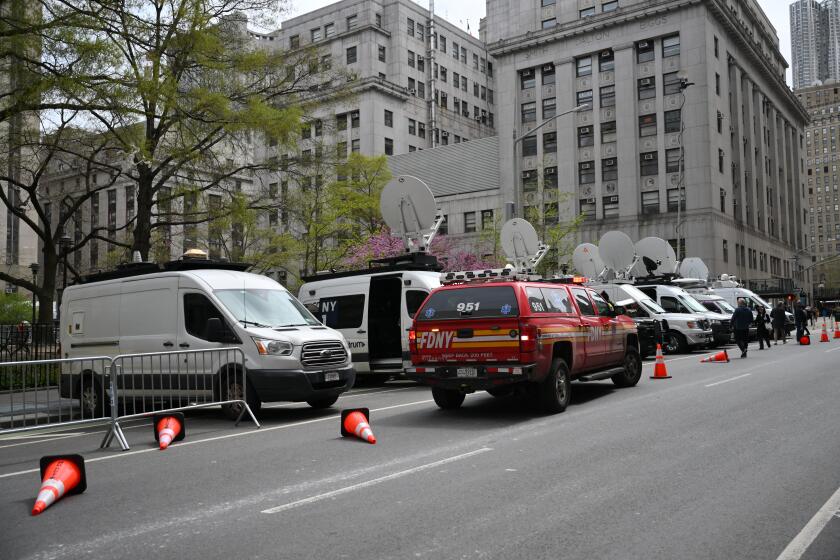4 Soldiers Eligible for Execution if Convicted
Four U.S. soldiers accused of murdering three detainees during a raid in Iraq in May are eligible to receive the death penalty if convicted, a military investigator has determined.
In a report summarizing the military equivalent of a grand jury investigation, Lt. Col. James P. Daniel Jr. concluded that four members of the 101st Airborne Division deliberately killed the detainees and then tried to cover up by making it look as if the prisoners had attempted to escape.
The four soldiers, Staff Sgt. Raymond L. Girouard, Spc. William B. Hunsaker, Pfc. Corey R. Clagett and Spc. Juston R. Graber, say they are innocent, and lawyers for two of the men called the death penalty eligibility egregious.
“They are trying to say these are just rogue soldiers and this has nothing to do with battle stress or orders. We disagree,” Michael Waddington, Hunsaker’s civilian lawyer, said Saturday.
The three men who were killed have not been identified. They are referred to only as “detainees of apparent Middle Eastern descent” in the investigator’s 10-page report.
A copy of the report, dated Aug. 31, was obtained by The Times on Saturday. Army spokesmen in Iraq and Washington declined to comment. The report findings were first disclosed Saturday by the Associated Press.
At least 20 U.S. service members have been charged in connection with the deaths of Iraqis in the war. Most cases have resulted in acquittals or conviction on lesser charges.
Military executions are rare. The last soldier to be put to death -- for rape and attempted murder of a child while the soldier was stationed in Europe -- was hanged in 1961.
The final decision to carry out a military death sentence must be affirmed by the president. In 1997, then-President Clinton authorized life in prison without parole as an alternative to death.
Among the few on military death row at Ft. Leavenworth, Kan., is ex-Army Sgt. Hasan Akbar, convicted of killing two service members and wounding 14 in an attack on his own base at the start of the Iraq war.
The killing of the three detainees has raised questions that go beyond the four accused soldiers. The military is also investigating whether Col. Michael Steele, commander of the 101st Airborne Division’s 3rd Brigade, encouraged unrestrained violence and condoned a culture of racism among his troops. Investigators have said that Steele handed out knives to his soldiers as rewards for killing insurgents.
All four of the accused were members of his brigade.
Steele, a storied officer who led the Somalia rescue mission recounted in the book and movie “Black Hawk Down,” has been issued an administrative reprimand. He denies the accusations and is fighting the disciplinary action against him.
The May 9 raid targeted insurgents believed to be operating on an island near Samarra, in the vicinity of a chemical complex. According to testimony at the investigative hearing, the U.S. soldiers taking part in the raid believed they were under orders to kill all military-age men. The three detainees who were killed had been taken into custody and bound with plastic handcuffs.
Pfc. Bradley L. Mason testified that the four accused soldiers had taken the detainees out of a house they were searching and had indicated they were going to kill them. Mason, who had already shot and killed one man standing in a window, said he remained behind.
Mason testified that he heard gunfire. He said one of the accused soldiers told him the detainees had broken free and attacked, forcing them to shoot. The same soldier later told him that the escape story was made up, Mason testified. Mason also said he was threatened and pressured to keep quiet about the incident.
The investigator’s report charged the accused soldiers with “staging the murder scene” to make it look as if the detainees had cut Hunsaker with a knife and hit Clagett as they purportedly tried to escape.
Clagett’s civilian lawyer, Paul Bergrin, suggested it was Mason who was not telling the truth.
“Hunsaker was cut and stabbed; Clagett was hit in the face,” Bergrin said Saturday. “The detainees cut themselves free while in the course of trying to escape. Using reasonable and necessary force, [the accused soldiers] shot and killed three detainees who were known terrorists.”
Bergrin said his client and the other soldiers were being prosecuted “because of the political climate,” and he said they would be acquitted at court-martial, which is expected to take place at Ft. Campbell, Ky., the home base of the 101st Airborne.
The four have been jailed in Kuwait since their arrests.
ricardo.alonso-zaldivar@
latimes.com
More to Read
Start your day right
Sign up for Essential California for news, features and recommendations from the L.A. Times and beyond in your inbox six days a week.
You may occasionally receive promotional content from the Los Angeles Times.






